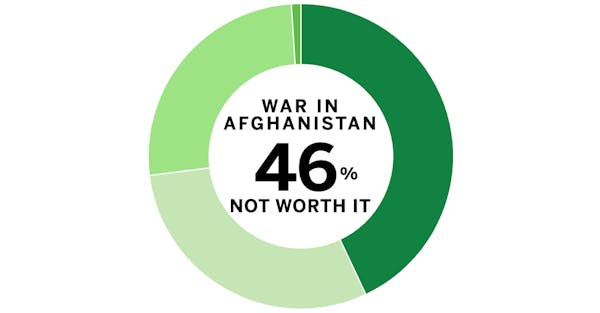Nearly half of state voters support the withdrawal of U.S. troops and civilians from Afghanistan but disapprove of how the Biden administration went about it, according to a new Minnesota Poll.
And 46% — including half of Republicans polled — said that America's two decades of military intervention in that country was not worth it.
"This getting out of Afghanistan happened really fast — I don't think [Biden] really got enough guidance on that," said Frank Roder, a 73-year-old retiree in Montevideo. He added that not only had the troops left behind a lot of military equipment that the Taliban could use, but the U.S. also "had to fight to get some of the people out, and I don't know if all the people are out yet."
The poll of 800 Minnesota registered voters was sponsored by the Star Tribune, KARE, MPR and FRONTLINE, and conducted one month after the Taliban took control over Afghanistan and the U.S. moved to end 20 years of military intervention there.
As the U.S. prepares to take in up to 50,000 evacuees, slightly more than half — 53% — of voters said they support the resettlement of Afghans in their community. That figure climbs to 67% for residents polled in Hennepin and Ramsey counties.
April Schuefftan welcomes the prospect of Afghans rebuilding their lives in Eden Prairie, where she lives in an apartment building that is already home to many refugees and immigrants.
"There's a great school district out here. ... There are a lot of programs in Eden Prairie that can help them," said Schuefftan, a 60-year-old personal care assistant.
She's among the 31% of those polled who say America's 20-year military intervention in Afghanistan was worth it.
"They were protecting our country," Schuefftan said of U.S. troops.
Still, she said she had concerns about the way the Biden administration handled the withdrawal.
"It didn't seem real organized," Schuefftan said. "People were running for their lives, and then some Americans are still stuck there and they can't get out yet. [Biden] said everybody was going to get out."
Just 27% of those polled support the U.S. withdrawal and approve of how the Biden administration handled it — a figure that jumps to 48% among Biden voters and falls to just 5% among Trump voters. Overall, 15% of those polled oppose the withdrawal entirely.
The U.S. invaded Afghanistan in 2001, one month after the Sept. 11 terrorist attacks for which Osama bin Laden took credit. The al-Qaida leader spent years hiding out in Afghanistan and eventually escaped to Pakistan, where American soldiers killed him in 2011.
Just 37% of residents polled in southern Minnesota said America's military intervention in Afghanistan wasn't worth it, fewer than any other region in the state. Nearly half — 48% — of voters in Hennepin and Ramsey counties, along with those in the metro suburbs, felt the same — as did 47% of northern Minnesotans polled.
Fifty percent of Republicans and people ages 18 to 34 who were polled believed U.S. involvement in Afghanistan was not worth it. Those who voted for the president were almost equally split on the question: 47% of Biden voters said it wasn't worth it, compared with 45% of Trump voters who felt the same. A similar split emerged between people without a college education and those with a college degree.
"I used to think that wars are OK but nobody wins a war — usually you lose a lot of lives," said Roder. "In Afghanistan … you've got all these people with their limbs tore off and crippled and all that stuff and you see these people and you ask, 'Is it really worth it?' I don't think so."
He added, "We've got enough places to spend our money without going to war. We've got a lot of stuff that could be taken care of here in the United States."
Mason-Dixon Polling & Strategy Inc., of Jacksonville, Fla., surveyed 800 registered Minnesota voters by cellphone and landline in mid-September. The margin of sampling error for the poll is plus or minus 3.5 percentage points.
About one-third of those surveyed oppose the resettlement of Afghans in their communities, with a stark divide along gender lines: 44% of men are against Afghan refugees living in their towns, compared with just 21% of women.
"If the vetting process was done properly, I think I'm OK with that," said Chad Gerbig, a 52-year-old salesman in Orono. "It's just, I don't know if I trust that system either."
Gerbig said he wants to ensure that people are screened for connections to terrorism, violent criminal records, COVID-19 and other diseases. He pointed to cases of measles discovered among Afghan evacuees at some military bases, which is leading to resettlement delays amid efforts to test and vaccinate newcomers for the disease.
Gerbig said he believes that American troops should have been more strategic and assertive, and that 20 years was a long time to be in Afghanistan.
"If we were going to be there, I don't think we should have been there that long," he said.
Maya Rao • 612-673-4210

Legendary record store site in Minneapolis will soon house a new shop for musicheads

Former Gov. Jesse Ventura boasts he could beat unpopular Trump or Biden if he ran for president

Dave Kleis says he won't run for sixth term as St. Cloud mayor
Newspaper boxes repurposed as 'Save a Life' naloxone dispensaries

